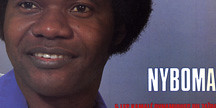
And so we find Nyboma, preferred voice of many a Congolese music aficionado, another furlong down the track in his long-running career. During the early ‘80s, his music evolved from Cuban pastiche to something altogether more local and unique. While the four tracks comprising Pepe still feel Latin, their formal attributes and energy point to the inventiveness and adaptability characteristic of African music and, for that matter, of African culture in general. Many years after my initial encounter with soukous, the dance music indigenous to Congo/Zaîre, I have no difficulty recalling the thrill of hearing something so different and immediately seductive. I still experience what art critic (and biker) Robert Hughes termed ‘the shock of the new’ whenever I hear great examples of this music. Luckily, the sensation seems evergreen, and has yet to fade in any measure. I hope it never does.
These songs will repay several fold the time you give them. They also interface nicely with mojitos (fresh mint, thank you), Patron añejo margueritas and kumquatinis (the last drink lacks an elegant label, but is the staff of life when the mercury climbs above 80º). Again, as with some of the earlier posts, this lp was a shop copy played repeatedly with a crap stylus. Hopefully my efforts to expunge sonic detritus will yield dividends within your media player.
I've always been curious about one aspect of soukous, that being the diminished presence accorded bass guitar in its overall mix. Other cultures have emphasized bass, often because outdoor venues, rather than radio or concert halls, were the only means of exposure for the music in question (cf. Jamaican reggae in the ‘60s and ‘70s). It has been my experience that women respond to bass by means that men can’t hope to know. Many of my favorite bass players are women: Carole Kaye, session stalwart of Hollywood recording studios; Talking Heads’ Tina Weymouth; and Jocelyn Lanois from Martha & the Muffins and Crash Vegas. Whenever Kid Creole & the Coconuts played in New York, I positioned myself near Carol Cleveland’s amplifier. Gail Ann Dorsey added immeasurably to David Bowie’s Earthling, especially “Little Wonder.” And on and on...
Men tend to like Afrobeat, the James Brown-derived funky stuff — with bass galore — from Nigeria, still best identified in the popular mind with Fela Anikulapo-Kuti. Possibly owing to coverage in the Beastie Boys' magazine Grand Royal (the latter's influence all the more amazing, given that comets appear with greater dependability), the past decade has seen an increasingly bull market for Afrobeat. On the other hand, many women of my acquaintance ‘get’ soukous straightaway on a deep, wordless and entirely intuitive level. I’d love to know why, and would be happier still to learn it had something to do with that extra layer of subcutaneous tissue. The jury's still out on this one.
PEPE (@160)
Comments